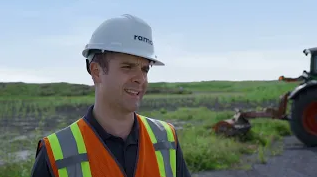Type a word to start your search

Type a word to start your search


[VIDEO] In 2018, the Québec-based company Ramo, which has expertise in plant-based environmental technologies, teamed up with waste management and recycling provider WM to implement its Evaplant technology on WM's landfill site in Ste-Sophie, with the aim of reducing volumes of leachate generated by the disposal site. This collaboration, which benefited from the support of the CRIBIQ and the Natural Sciences and Engineering Research Council of Canada (NSERC), as well as from the partnership of the Institut de recherche en biologie végétale (IRBV) and Polytechnique Montréal, led to the development of the PhytoVaLix project.
The treatment of the residual liquid that comes from the percolation of rainwater through landfilled waste, known as "leachate" or "leachate water", poses major challenges for landfill sites, where the volume limits for discharges are sometimes reached. Currently, conventional leachate treatment technologies involve high costs and fail to make the most of the resources contained in the leachate.
Ramo's Evaplant technology makes it possible to recover and reduce the volume of a portion of the leachate generated by landfill sites. This zero-liquid-discharge solution relies on the high water consumption and transpiration of fast-growing willows to reduce wastewater discharges, recover the resources it contains and capture atmospheric carbon.
"Phyto" for phytotechnology, "Va" for valorization, and "Lix" for leachate – lixiviat in French –, the PhytoVaLix project is the fruit of a collaboration that has succeeded in introducing an innovative approach to solving a range of problems associated with landfill sites in a sustainable and ecological way, by enabling WM to achieve several major objectives, including significantly reducing the volumes of leachate discharged into the environment, revegetating the Ste-Sophie landfill site, contributing to the development of the regional economy and capturing atmospheric CO2.
The collaborative aspect of the PhytoVaLix project was essential to its success, and the CRIBIQ played a key role. Its contribution of $419,485 provided a crucial boost to the field of phytotechnology, by contributing to the training of the next generation of leading-edge researchers as well as by enabling more in-depth fundamental research intro the development of the Evaplant technology.
"This collaboration was an opportunity for research, learning and development that strengthened innovation in the field of environmental biotechnologies. The PhytoVaLix project illustrates how investment in research and development (R&D) can both revolutionize wastewater management and contribute to the growth of new talent and the advancement of our society towards more sustainable practices." – Mohammed Benyagoub, CEO, CRIBIQ
"The collaboration between the various partners in this project was absolutely essential. Thanks to everyone's commitment and hard work, we have transformed a research project into an economically viable technology with a strong positive impact on the environment." – Xavier Lachapelle-T., Associate and Director of Phytotechnologies, Ramo
As of today, the Evaplant technology is in use at several landfill sites in Quebec, marking the start of a new era in wastewater management. Ramo has also launched its very first project in Abitibi, this time opening up the path to new perspectives for the application of this innovative technology in the mining sector.
Find out how the technology behind the PhytoVaLix project is propelling the boudaries of phytoremediation and redefining landfill effluent management, while helping the society to move towards sustainable practices!